Inception of Prison Ministry!! |
PRISON MINISTRY
1. Interaction with Prison Inmates 2. Bailing & Extending Legal Support
|
|---|
"Lord remember me" Said the thief on the right hand side of Jesus crucified.
PRISONER:
The persons who are convicted are in no lesser plight. They spend their prison term worrying about their families. They are helpless. There is hardly anyone who would send them information regarding the plight of their families. In some cases, he is not sure whether his wife would still be waiting for him or would have gone with another man. The thoughts of children would be haunting them regularly. Some prisoners come out on parole after having spent certain number of years in prisons & few of them earnestly try to do some work & provide for the family, but many a times the income is too poor. Some of them would also encounter people who would be wanting him to settle the amounts his family has borrowed. A study shows that 10% of such prisoners on parole commit suicide. There are occasional attempts within prison cells also for committing suicide. The problem of prisoners is not less even after release where would they go to? Will the community accept them? Will his family accept him? How will he earn an income? Has he got a skill to work & earn? Who will employ him? Where will he find capital for doing a business? Is there someone who would confer him, support him & give him the needed encouragement & motivation to persist & live? In the absence of any alternatives his only option is to go back to a life of crime – in many cases not willingly but rather forced into.
In the case of women prisoners also, the situation is not any different. The only advantage is that she can keep with her children up to 5 years of age, which again is a matter that can be debated.
Read More: Prison Welfare Activities
 |
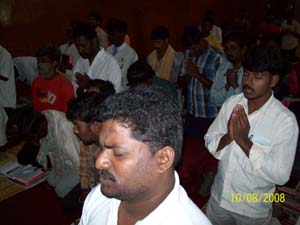 |
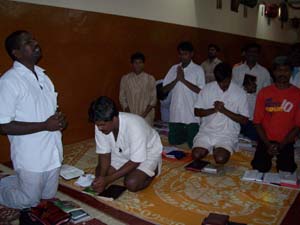 |
|
| In-Prison interactive Services conducted every month on 1st Saturdays and 3rd Saturdays. Moral instructions and Counseling follows | |||
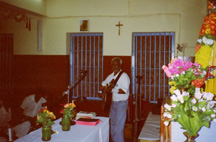 |
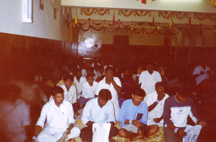 |
 |
|
 |
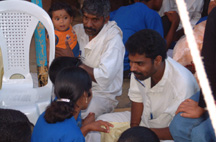 |
 |
|
PCH Children meeting their parents at Prison |
Building a bond between the parents and the children for reconciliation |
Children Singing for their parents in Prison. Dec 2005 |
|
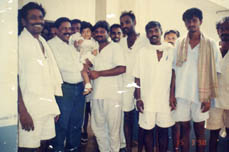 |
 |
 |
|
Reny George and Rhema with chapel Fellowship Group at Central Prison, Bangalore. |
Teena Reny cooking Christmas |
Reny George distributing toiletries to the women prisoners at Bangalore Central Prison. |
|
It is usual for most of us to think of abnormal behaviour as arising from factors not understandable and not under our control. As a result most often behaviour is attributed to super natural forces or to religious reasons. During the last 100 year there have been major advances in understanding human behaviour, on the basis of the functioning of the brain, the childhood experiences, current life situation as well as due to mental illnesses. Specifically it is now not acceptable to think of behaviour which brings people into conflict with law (criminal behaviour) to be totally un-understandable and the person to be thought of as a bad person.
Early childhood experiences of the parents form a very important influence in the formation of the personality and reactions to various situations. It is for this reason there are many proverbs in the different languages which emphasizes the importance of family, adults and childhood. Generally people with unhappy childhood tend to have difficulty relating to adults and society in a healthy manner. If the individual has been exposed to severe degrees of trauma of deprivation or has not experienced discipline they tend to have difficulty in accepting the social norms. So, it is important to ask about the early experiences of people who repeatedly come into contact with law.
The other dimension is in relation to the functioning of the brain. All of us know that people who take alcohol or other intoxicants show behaviour which is not within their control. Similarly, any serious illness or injury to the brain or illnesses affecting the brain can bring about abnormal behaviour. A very good example is epilepsy. In this illness either before a fit, or during the fit or after the fit individuals can show behaviour which is abnormal. Such changes in behaviours can be seen in situations where the brain is affected in one way or the other. Especially this would be considered when a person is intoxicated, has a serious illness or head injury or fever prior to a criminal act.
Some types of mental illness can give rise to abnormal behaviour. The most common of this is a group of disorders called psychosis in which the person experiences abnormal sensations, abnormal feeling, abnormal thoughts and responds to them as though they are real. When a person as a result of some of these illness has suspiciousness he or she can respond to that trying to protect himself or herself or harming the person thought to be the enemy. Abnormal behaviour arising from mental illness should be thought of any time, when the criminal behaviour occurs in an impulsive manner without any provocation and the person does not try to escape or run away from the situation.
By knowing above mentioned understanding of behaviour – Prison Fellowship Bengaluru – somehow helps the prisoner to be a wholistic and normal person in the main stream of society.
High Security Central Prison



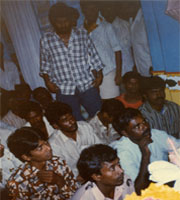
PFB condects counselling at the quarantine block in Central Prison Bangalore.
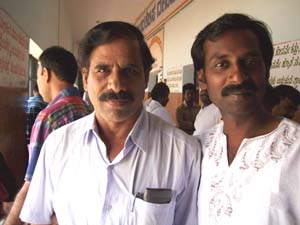
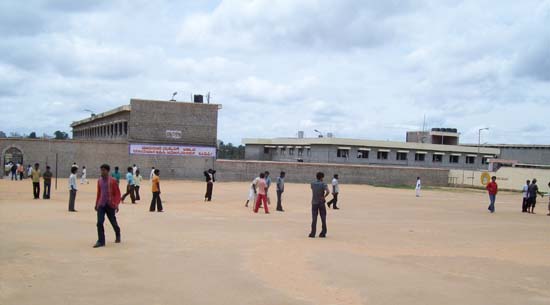
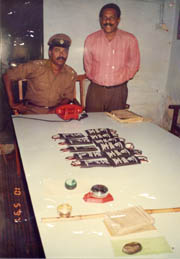
Issuing spectacles to the Prison Inmates at Central Prison Bangalore

PF distributes games items to the Juveniles at Central Prison Bangalore
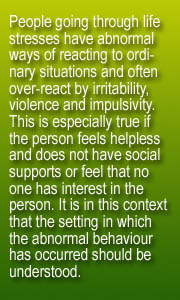
"Not by might nor by power, but by My Spirit"
Says the LORD of hosts.
Zech 4:6 NKJV
